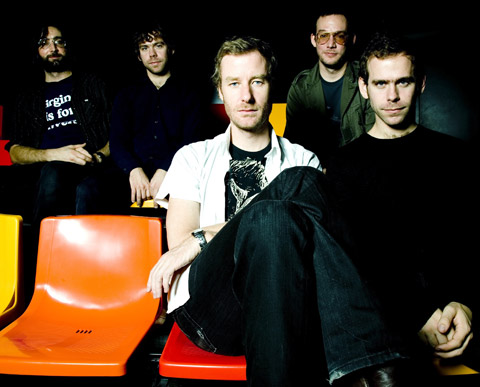
NATIONAL PRIDE “We made our first record when the Strokes first record came out, and there was Interpol, Yeah Yeah Yeahs, tons and tons of bands,” says Matt Berninger (center). “And we were playing open-mic nights.” |
Last summer, Bret Easton Ellis was pimping his latest novel, the Less Than Zero sequel Imperial Bedrooms, with a reading at the Brattle Theatre. During the follow-up Q&A, he referenced the trendy pop culture references he makes in his writing, saying "I think of what the narrator's tastes would be like, what they would be listening to. [Imperial Bedrooms narrator] Clay is, like, a middle-aged white dude — he's listening to the National a lot." That might sound like a backhanded compliment to some, but National frontman Matt Berninger doesn't see it that way."It would make total sense that people in their 30s and 40s would be into us," he says by phone from the UK before taking the stage at the Leeds Festival late last month. "I'm 40 years old, and I'm writing about things that are in my life and that I lay awake thinking about. It's connecting with my peers, but what I find exciting is that it's also connecting with 15-year-old girls, apparently."
The National seem to be among the ranks of Bon Iver, Adele, and TV on the Radio as some of the fresh-faced replacements for tired cranks like Sting, Billy Joel, and the Eagles when it comes to the music Baby Boomers and — now Gen-Xers — are latching onto. What's perhaps more interesting is that younger fans are also joining the class, crisscrossing what has traditionally been a fairly wide cultural gap — just scan the audience when the band play Friday at Bank of America Pavilion.
"It's a thing like when I was in high school I became obsessed with Leonard Cohen and Tom Waits," Berninger says. "The idea that maybe in the future we'll be in the league with those artists is the greatest thing that I could ever aspire to. It's a really awesome and odd thing at our shows when there are multiple generations of people; there'll be gray-haired men singing along with 16-year-old hot young girls, singing the same lyrics — and I think we're really, really lucky to have people from multiple generations connecting to us."
Part of it likely has to do with the confessional manner in which Berninger positions his much talked about baritone; he's not afraid to put his emotions on display, which can be completely ambiguous or heartbreakingly candid. "You're showing your ugly sides, your sentimental sides, and I think that's something missing in music," he says, "I think people are afraid of sounding sincere and earnest. When I say sentimental, I don't mean it in a disparaging way. I mean, like, to choose the word 'love' in a song and to use an expression of love, you don't hear it very often because people are embarrassed to not sound cool, or to sound saccharine, and I kind of miss that."
His sees many artists as afraid to show their sensitive side unless it's in some sort of clever or ironic way. "I'm so bored with that. I love a little bit of the swagger or posture, but the artists that balance that swagger out with a bit of sincerity — those are the artists that I will always trust. "